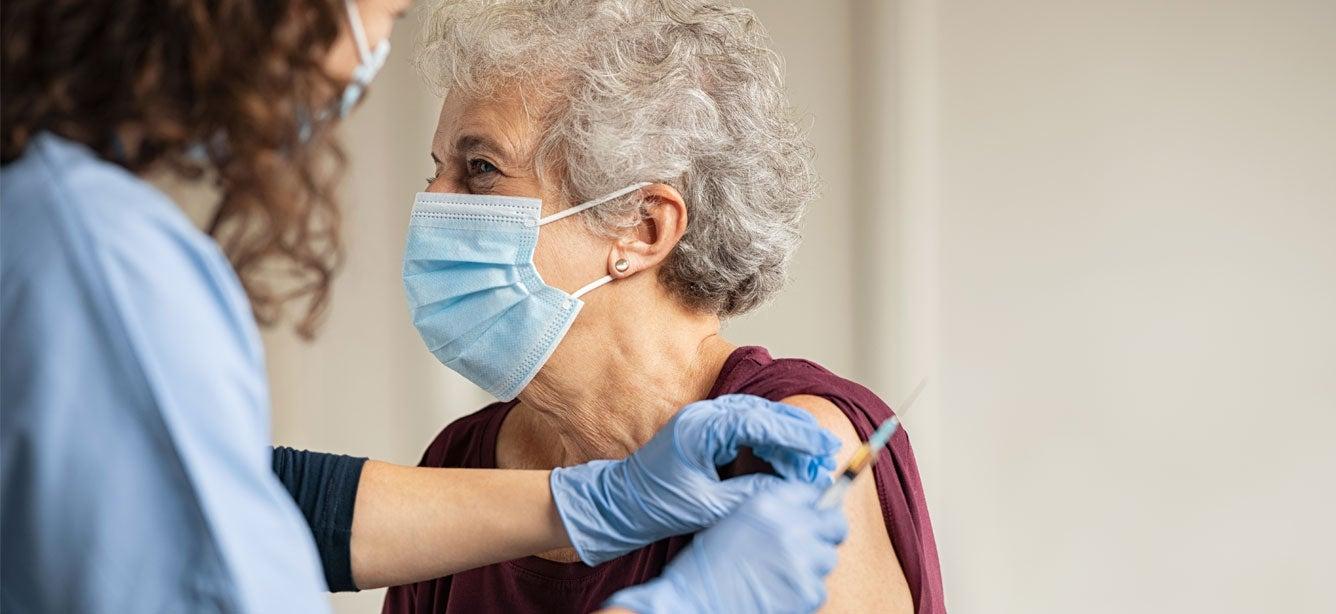
Related Topics
The 2025-2026 flu season is shaping up to be one of the most severe in 25 years, and health care experts everywhere are sounding the alarm. The culprit is a novel strain called H3N2 subclade K—a mutation of the common flu A subtype.
"This new strain has symptoms of really high fevers. It has a really bad cough that won't go away, very phlegmy, and also vomiting and diarrhea and lots of joint aches as well as muscle aches," said Dr. Juanita Mora, the national spokesperson for the American Lung Association, in an interview with NBC Chicago.
For older adults and people with chronic conditions, the annual flu vaccine is a simple, effective way to reduce the risk of serious flu illness and complications.
What are the 2025-2026 flu vaccine recommendations?
The Centers for Disease Control and Prevention (CDC) recommends the 2025-2026 flu vaccine for everyone age 6 months and older.
This year, CDC also recommends an updated 2025-2026 COVID vaccine for people age 6 months and older based on individual-based decision-making. Respiratory syncytial virus (RSV) vaccines are recommended for everyone 75 and older, and for adults ages 50 to 74 who have a higher risk of severe illness.
The latest flu, COVID, and RSV vaccines are available now.
If you have questions about which vaccines are best for you or when to get them—or how long to wait after a COVID infection before getting the most recently approved vaccine—talk to your doctor.
The single best way to reduce your risk from flu and possibly serious complications is to get the flu shot every year. Here are some flu facts to help explain why getting your vaccine is so important.
The importance of flu shots for older adults
The single best way to reduce your risk from flu and possibly serious complications is to get the flu shot every year. Here are some flu facts to help explain why getting your vaccine is so important.
What is influenza, or flu?
Are influenza (flu) and COVID-19 caused by the same virus? The answer is no. Influenza is a highly contagious respiratory infection caused by the influenza virus. The flu virus is different from the SARS-CoV-2 virus that causes COVID—and two different vaccines are required for protection. People who have had the COVID vaccine or are planning to be vaccinated against COVID can safely get the flu shot this year and every year.
Although they are caused by different viruses, there are some similarities between COVID and flu.
Just like COVID, flu is easily passed from person to person when someone coughs, talks, or sneezes.
You can also catch the flu virus from recently contaminated surfaces or objects that have the virus on them and then touch your mouth, eyes, or nose.
What are the symptoms of flu?
Some symptoms of flu are similar to the common cold, like sneezing, cough, sore throat, and chest discomfort. But flu usually starts more suddenly and symptoms are much more severe than the common cold. Flu symptoms also include fever, body aches, chills, headaches, and feeling tired.
People often ask, “Can you get the flu from the flu shot?” No, you cannot. The flu shot is made from inactive (dead) virus that can't cause influenza infection. But you may get brief, mild side effects from the flu vaccine that can feel almost flu-like.
Why are older adults at higher risk for flu?
While each flu season differs in severity, during most seasons, people 65 years and older bear the greatest burden of disease. CDC estimates that between 70-85% of seasonal flu-related deaths and between 50-70% of seasonal flu-related hospitalizations occur in older adults.1 People age 65 and older are at higher risk of developing serious complications from flu compared with younger adults. This increased risk is due in part to a natural decline in immune response that comes with age.
Older adults with chronic conditions, like heart disease, diabetes, and lung disease, such as asthma or or chronic obstructive pulmonary disorder (COPD), are at highest risk for developing life-threatening complications from the flu.
Because of age-related changes in their immune systems, people 65 years and older may not respond as well to vaccination as younger people. But although immune responses may be lower in older people, studies have found that the flu vaccine has been effective in reducing the risk of doctor visits and hospitalizations due to the flu.
What’s more, high-dose vaccines and the adjuvanted flu vaccine can help bridge immunity gaps for older adults.
Why are flu shots needed every year?
Flu vaccines are updated each season to keep up with changing viruses. While this season’s 2025-2026 flu vaccine isn’t a perfect match, experts agree it still provides meaningful protection, especially against severe illness, hospitalization, and death. No vaccine guarantees you won’t get sick, which is why vaccination works best alongside other preventive steps like staying home when ill and practicing good hygiene, particularly for older adults.
It’s also important to note that immunity against the flu virus decreases over a year. That means annual vaccination is needed to make sure everyone has the best possible protection.
Because immunity may decrease more quickly in older people, it is especially important that older adults are not vaccinated too early, like in July or August.
CDC and ACIP recommend specific flu vaccines for people age 65 and older. These vaccines are:
- Fluzone high-dose seasonal flu vaccine
- Flubok recombinant flu vaccine
- Fluad adjuvanted flu vaccine
Studies have shown these vaccines trigger a better immune response in older adults than the traditional flu vaccine. If you are 65 or older, ask for one of these vaccines when you are getting your flu shot from your doctor, pharmacists, or a vaccine clinic. If one of these vaccines is not available or will not be available soon, a traditional flu shot is recommended.
What about the pneumococcal vaccine?
The pneumococcal vaccine protects against serious pneumococcal infections (e.g., pneumonia, meningitis, and bacteremia) that can cause severe illness and death. CDC recommends pneumococcal vaccination for children younger than five years and adults 50 years or older, as well as for children and adults at increased risk for pneumococcal disease.
Since pneumonia is a common complication of the flu in older adults, getting the pneumococcal vaccine is another important way you can protect yourself from severe flu illness and hospitalization.
Talk to your doctor to find out which pneumococcal vaccine is recommended for you. If you are not up to date on your pneumococcal vaccine, you can get that vaccine when you get your flu shot.
Does Medicare cover vaccines?
Yes. Medicare Part B covers the flu, COVID, and pneumococcal vaccines with no out-of-pocket costs to Medicare beneficiaries.
Schedule your flu shot today
According to CDC, the best months for most people to get vaccinated against the flu are September and October. But even if it’s later in the season and you haven’t received your flu shot, it’s not too late. Flu season typically peaks in February, but it can last right through March as well.
It's important to note that it takes about two weeks after the flu shot to develop antibodies or protection against the virus.
Getting your annual flu shot can help you stay active, healthy, and independent. Ask your health care provider which flu vaccine is right for you. "At NCOA, we encourage everyone, especially older adults and those with underlying health conditions, to talk with their health care provider about their personal risk and the best steps they can take to stay protected this season,” said Dorothea Vafiadis, Senior Director of NCOA's Center for Healthy Aging.
Vaccines are available at doctor’s offices, pharmacies, and urgent care centers in your area. The CDC website can help you find a convenient location to get your flu, COVID, and/or RSV shot. You can also check with your local senior center or Area Agency on Aging to see if there are vaccine clinics in your area.
Source
1. Centers for Disease Control and Prevention. Flu & People 65 Years and Older. Found on the internet at https://www.cdc.gov/flu/highrisk/65over.htm



